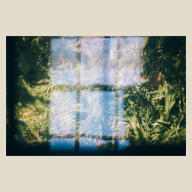Born and raised in the Orkney Islands, Cooper embraced the work of traditional folk artists such as Davy Graham and Bert Jansch while growing up before leaving the islands to travel, eventually residing in London. A chance meeting with Simon Tong (the Verve, the Good, the Bad the Queen) at a folk club in London saw the pair bond over their love of traditional English and Scottish folk music. The duo started writing and recording together, with the help of electronic multi-instrumentalist David Nock, and went on to release their debut eponymous album in 2010 as Erland the Carnival. Two more albums followed -- 2011's Nightingale and 2014's Closing Time -- while Cooper and Tong also turned their attention to their Magnetic North project with vocalist and composer Hannah Peel. Orkney: Symphony of the Magnetic North -- which was written by Cooper as an album that used the landscape, people, and legends of the isles that he grew up in as inspiration -- was released in 2012 and was followed by the 2016 release Prospect of Skelmersdale, which was inspired by the town where Tong spent his childhood.
By 2018, Cooper had branched out on his own, delivering his first solo album, Solan Goose. The first in a triptych of albums, the release saw Cooper returning to the islands where he grew up for inspiration. Naming each track after birds from the area, the album moved from simple piano pieces to lushly orchestrated, contemporary classical passages. That same year, he also teamed up with William Doyle on the similarly bird-themed album Murmuration. Cooper's second installment of the triptych followed in 2019 with the release of the Orcadian-inspired Sule Skerry. The album once again saw him moving deeper into the world of contemporary classical, while being joined on the album by the likes of composer and violinist Anna Phoebe, Scottish singer/songwriter Kathryn Joseph, and British folk artist Kris Drever. He brought the trilogy to a close in 2020 with the release of the immersive and heartfelt Hether Blether. ~ Rich Wilson, Rovi





